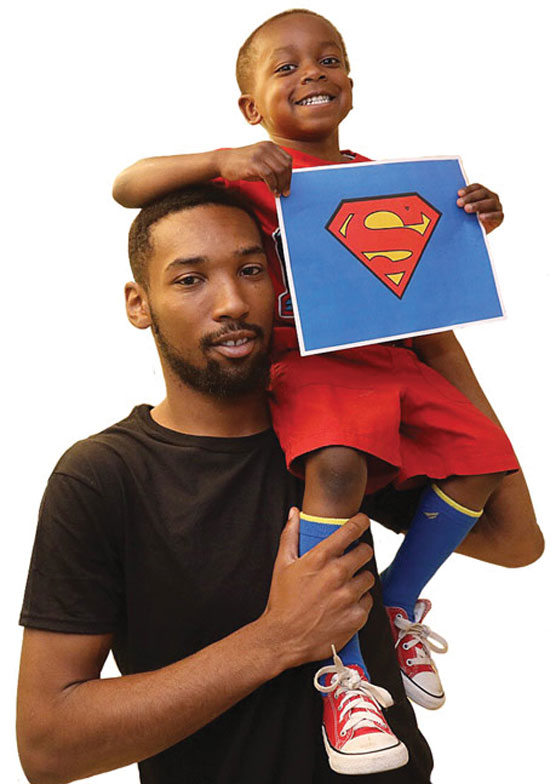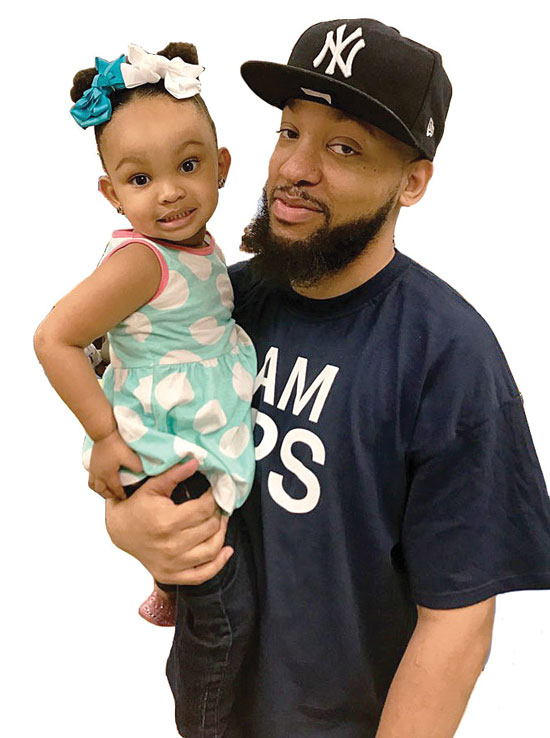DADS PLAY—TYRESE GILBERT plays with his 3-year-old son, Benaiah, at the 10th annual March DADness basketball tournament, March 17, 2018 at Pittsburgh Obama. (Photo by Rob Taylor Jr.)
by Courier Newsroom

The perception of fatherhood has expanded over the past few decades. Parenting is more widely seen as a partnership with equal responsibilities, with people in the fatherly role possibly having more involvement than in the past. As we celebrate the roles fathers, grandfathers and father figures have in our lives, it is also important to consider how that role affects them.
Longstanding research has shown that the role of father figures in children’s lives is important to their well-being. Children with involved fathers do better in school and have a reduced chance of criminal involvement or drug use (https://www.cdc.gov/nchs/data/nhsr/nhsr071.pdf). The Fatherhood Project, a program in the Department of Psychiatry at Massachusetts General Hospital, cites research that has shown that “[c]hildren who feel a closeness to their father are twice as likely as those who do not to enter college or find stable employment after high school; 75 percent less likely to have a teen birth; 80 percent less likely to spend time in jail; and half as likely to experience multiple depression symptoms.” The project also highlights that research showing that, when fathers are engaged with their children during the prenatal period, they are likely to stay involved throughout the child’s life.

As people in the father role become more involved in their children’s lives, health care providers are learning more about how to support these fathers in their children’s health care. One University of Pittsburgh researcher and physician is studying, specifically, how to better support adolescent and young-adult fathers. Alicia Boykin, MD, pediatric fellow in Pitt’s Department of Pediatrics, runs the Young Fathers Study to find out how health care interactions influence the notion of fatherhood. The study focuses on fathers up to age 26 who either have children up to age 5 or are expecting a child. These fathers are interviewed about their thoughts on fatherhood and what their interactions with health care providers have been like. Dr. Boykin’s basic idea is that health care providers should be involving fathers more in health care because research shows that long-term health outcomes for fathers, mothers and children are better when fathers are involved.
“In this research, we’re finding that adolescent and young-adult fathers really enjoy being involved with their children,” said Dr. Boykin. “They have a lot of questions and concerns but often they feel that some of the attention—or a lot of the attention—is focused on the mother of the child. This focus is understandable, but we want to find ways to support fathers’ involvement both during health care visits and beyond.”
The American Academy of Pediatrics (AAP) notes that health care providers are some of the first people to engage with father figures in their father role. The organization encourages health care providers to support fathers and enhance their involvement by connecting with them early on. AAP offers guidelines to support fathers’ involvement. These guidelines include health care providers introducing themselves and engaging with both mothers and fathers during visits, emphasizing how children also look up to fathers as role models, taking time to understand each family’s composition and cultural beliefs and even screening fathers for depression (more information on these guidelines can be found here: https://pediatrics.aappublications.org/content/pediatrics/138/1/e20161128.full.pdf). Screening adolescent and young fathers for depression, Dr. Boykin said, is especially important because as they are becoming parents they are also navigating adolescence.
Like us at https://www.facebook.com/pages/New-Pittsburgh-Courier/143866755628836?ref=hl
Follow @NewPghCourier on Twitter https://twitter.com/NewPghCourier

